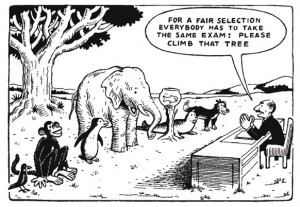Unless you’ve been hibernating under a rock you’ll be aware that the Leaving Cert results came out this week. As usual, the media focused almost exclusively on the two or three geniuses who managed to achieve near superhuman results, in some cases 9 A1s! These individuals are undoubtedly exceptional on so many levels and celebrating exceptional human beings in every field of human endeavour is a truly wonderful thing. I for one would hate to live in a world where individual achievement was ignored instead of exhalted.
However…
What about the exceptional individuals whose talents aren’t recognised or rewarded by the Leaving Cert? Are they to conclude that the things they are good at simply don’t matter or have no value in an educational context? Talents like leadership, teamwork, creativity and innovation – are these things really irrelevant when assessing their time at school and awarding college places?
I’ve been thinking about the Leaving Cert a lot over the last few months. What kicked it all off was an #edchatie discussion back in April on the possibility of achieving “A Better, Fairer Leaving Cert”. A few short weeks later I was delighted to hear the articulate and intelligent Fionnghuala King lambast the Leaving Cert at our school’s Graduation Mass (you can read excerpts of what she had to say here in the Mayo News). Then the day of the results thejournal.ie rang me for reaction to the results and to the exams system itself and 24hours later I was in the middle of a heated row with George Hook on Newstalk about the relative merits of the current system. Only four short days after the results and after a summer of exhausting media interviews The Irish Times finally acknowledged that I might have something of value to say and yet I find myself still grasping for a coherent alternative method of assessing students achievements at the end of five or sometimes six years of secondary education.
For what it’s worth here are my thoughts. I’m aware they are often contradictory but this is a complex issue!So let’s embrace the paradoxes and tease them out…
- Embracing change for the sake of change is a pointless and potentially damaging exercise.
- Nonetheless we MUST find a way to reduce the pressure on students without compromising the integrity of the current system which is viewed by most as relatively transparent.
- Transparency and objectivity are vital in a small country like Ireland which has always struggled with nepotism and corruption (exams which are externally marked & anonymous thankfully negate these negative societal traits).
- There is no simple or obvious utopian alternative but that doesn’t mean we shouldn’t keep looking for a lesser evil.
- We need a terminal exam which assesses academic ability & aptitudes??? (I’m not sure about this one…)
- Should a terminal exam be combined with some continuous assessment? Can we prevent plagiarism and maintain trasparency if we go down this route? Is there a danger of more grade inflation? Will parents/neighbours/teaching colleagues put pressure on teachers to give their son/daughter a higher grade than they deserve? Does this mean that those who shout the loudest will get the most? and how would this play out for students whose parents play fair? or don’t care? Aren’t teachers supposed to be advocates for their students not judge and jury? Will students just beg borrow or steal projects that they know will get them a good grade? And if this happens what are we willing to do about it? (Not very much, if this case is anything to go by).
- The Leaving Cert as it exists is an incredibly blunt instrument which assesses a very narrow range of aptitudes and abilities and all too often leads to rote learning and regurgitation. However, is a certain amount of knowledge (stored in your memory rather than in a computer) a prerequisite for analysis and synthesis and deep understanding? This might be a chicken and egg debate – which comes first? Certainly you cannot rote learn your way to 600 points in your Leaving Cert. But if you repeat and select only the subjects which require and reward rote learning you can certainly get 500 points.
- Exam technique and the ability to remain calm under pressure are the aptitudes which are rewarded most highly under the current system – if you fall down in either of these areas you fall down in your Leaving Cert. So God help you if you don’t (or can’t) nurture and develop these ‘talents’.
- It is unforgiveable that there is no repeat procedure for students who are hit by illness or bereavement, through no fault of their own, immediately prior to and/or during exams.
- It’s good that we offer a rounded education – I don’t think we should follow the British system where you could study English language, English literature, Drama and General Studies and then say you had studied 4 subjects for your A levels – let’s face it this is mostly different branches of the same subject and you’d have received a very narrow education indeed in your final two years of secondary school education.
- However, we currently offer a very narrow range of subjects, with a ridiculous bias in favour of students who are good at languages – most schools have their subject choices arranged in such a way that you must study three languages. So almost 50% of your leaving cert subjects are languages irrespective of what your interests, aptitudes and abilities are. How fair must that feel if you love Maths, Accounting, Business, Art, Tech Graphics and Woodwork??? I know I certainly resented being told that I ‘had‘ to do a science subject when I wanted to do a combination of History, Geography, Art and Music. I was lucky in many ways – English and French were also on that list whether I liked it or not – but in my case I loved languages.
- The range of subjects being offered is getting narrower all the time thanks to cutbacks. Physics, Chemistry, Accounting, Economics, History and Applied Maths are now all considered minority subjects. I mean seriously, WTF???
- The bell curve sets students up for failure. It’s not about your achievements, it’s about how crap your achievements are compared to Mary down the road. Vomit.
- We need to reform the system of college entry – the points system is so crude and so cruel we should be ashamed of ourselves. Fix this and a lot of the pressure, stress, worry and one-up-man-ship of the current system will dissappear.
That’s all I’ve got for now. Lots to grapple with.









